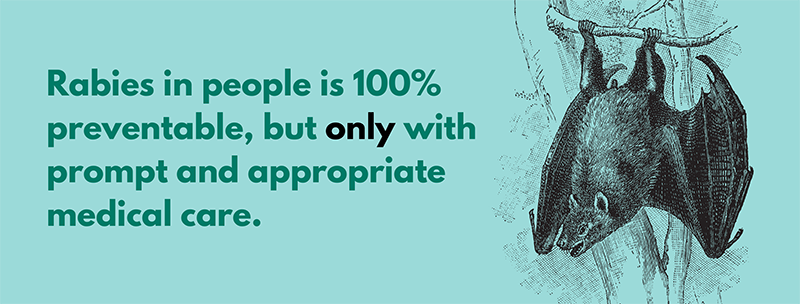Bats — rabid bats — have been in the news a lot lately, and many of them have been found here in Washington. So far in 2018, 29 bats have tested positive for rabies, putting us on track for a record season.
Each year, typically during summer months, our public health lab tests between 200 and 300 bats for rabies. Of those, an average of 15 turn out to be rabid. In 2017, 22 bats were found to have the rabies virus. Until this year, the highest overall number in a decade.
One of my jobs as a communications specialist at Department of Health is to warn people about public health threats and ways to stay safe. I write news releases covering topics like rabies, and often refer questions, like the ones below, to local health departments. Here’s what you need to know about bats.
“I have bats living in my barn. They come out in the evening.”
Flying bats that haven’t had direct contact with people or animals are not a risk for transmitting rabies. However, animals living in the barn are at risk of contact with bats, and should be vaccinated against rabies if appropriate.
“A bat has been sitting on my porch all day.”
A healthy bat typically avoids contact with people or animals and usually isn’t found resting on the ground. Rabid bats frequently lose their ability to fly, or do not fly well. That means they may be more likely to come into contact with people or pets. While a bat found on the ground may be ill, it could simply be an immature flyer that will fly away at dusk. As long as it isn’t near people or pets, leave the bat alone and check back later to see if it’s gone.
If you find a bat in a public area, where other people or animals may have come into contact with it, alert your local health department.
“We woke up to a bat flying around inside our house.”
If you find a bat in an area where people or animals may have come into contact with it, try to safely capture it, then contact your local health department right away. They will help decide if the bat should be tested for rabies. If tests show the bat doesn’t have rabies, you won’t need to get rabies treatment. If contact did or may have happened, but the bat can’t be captured for testing, call public health. They may suggest you go to the doctor for preventative treatment.
Rabies is a severe viral disease that is almost always fatal. Rabies in people is 100 percent preventable, but only with prompt and appropriate medical care.
“I’ve found several bats in my house or cabin.”
Bats may enter homes accidentally or to roost there. A single bat probably arrived through an open door or window without screens. If you have repeated incidents, you need to figure out how the bats are getting in. Living with Wildlife (PDF) from the Washington State Department of Fish and Wildlife explains how bats can enter a home. You may need pest control services.
“I was out on a walk and a bat brushed my face, neck and hair, then flew away!”
Clean the area with soap and water. Call your health care provider and local health department to determine the potential for rabies exposure and the need for preventive treatment.
And finally: “There was a bat in my house and I’ve trapped it in a Tupperware bowl… what now?”
First, never touch a bat with bare hands! If you’re certain the bat is dead, use gloves and double-bag it in plastic bags and call the health department. If the bat is not dead, punch small air holes in the lid of the container using a nail or small screwdriver. Follow your local health department’s instructions on next steps.
Here’s how you can reduce the risk of rabies exposure for you and your family:
Do not approach, touch, or keep wild animals as pets — including bats. It’s possible for other animals to carry rabies. Bats are the primary carriers here in Washington.
Teach your children never to touch or handle bats, even dead ones. Have your children tell an adult if they find a bat at home, at school, or with a pet.
Keep bats out of your living space by bat-proofing (PDF – https://wdfw.wa.gov/publications/00605/wdfw00605.pdf) your home.
Pets can get rabies if bitten by a rabid animal. Protect your pets and yourself by getting them vaccinated routinely. Dogs, cats, and ferrets are now required to be vaccinated in Washington. Ask your veterinarian for vaccine recommendations.
The bottom line on bats is to leave them alone. But if you think direct contact between a bat and a person or pet may have occurred, call your local health department for guidance.
Want great information about bats and other public health issues? The DOH website (https://www.doh.wa.gov/) is your source for a healthy dose of information.
– Washington State Department of Health









